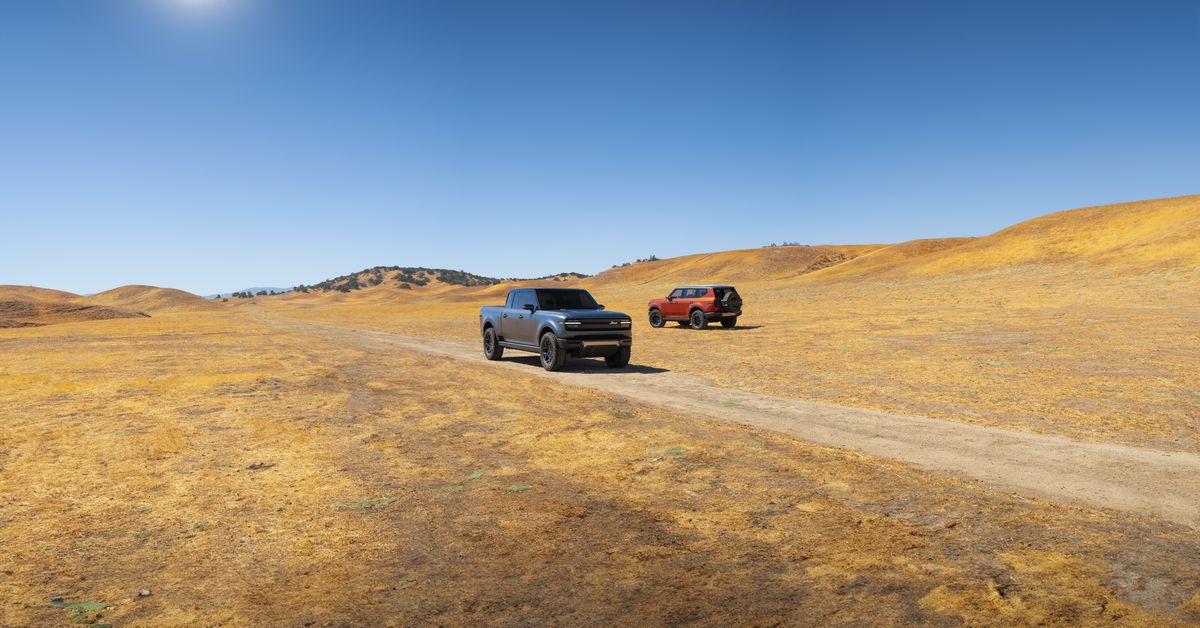Less than 12 hours after Scout Motors unveiled a pair of buzzy electrified vehicles last week, car dealers started threatening lawsuits.
Scout, which is backed by Volkswagen, thinks that dealers are history. It would rather sell its EVs directly to consumers, following in the footsteps of Tesla, Rivian, and Polestar in completely rethinking the business of car selling. But unlike those brands, it’s doing so while receiving financial support from an incumbent automaker: VW.
But if the company is nervous about challenging a century-old business model, it isn’t showing it.
“Scout is a 100 percent separate brand, separate entity, separate structure, separate everything,” Scout CEO Scott Keogh said last week, noting that the Scout buying experience will be “transparent, super fast, and super easy.”
Digital sales and service
To make that happen, Scout Motors is relying heavily on a digital platform that it’s building in-house. “Scout Motors doesn’t have any legacy apparatus,” Cody Thacker, Scout’s VP of growth, said. “We kept asking ourselves, if an OEM could start over again, what would they do differently?”
This clean-sheet approach is trying to remake car buying, one of the most loathed financial transactions Americans go through. According to research compiled by Scout, the car-buying experience consumes an average of 13 hours, 31 minutes per shopper. Just 8 percent of consumers have high or very high trust in dealers, resulting in more than 180,000 dealer-related complaints to the Federal Trade Commission every year. And nearly 70 percent of customers prefer independent service shops over dealer servicing because of issues like overcharging and delays.
Car buying is one of the most loathed financial transactions in America
Add in the fact that, nationwide, 49 percent of dealers are “not excited at all” to sell EVs, and Scout sees its rationale for smoothing out the experience. It also wants to more closely control customer data, allowing the company to target sales in certain areas, control vehicle supplies, and adjust incentives to keep the company profitable.
“A big point of frustration for consumers is that they want transparency in pricing and they resent all the hidden fees and markups. Only through a direct-to-consumer model can we tackle these head on and resolve them,” Thacker said.
Scout envisions its sales platform as a place where customers can do all the things they’d normally do at a dealership, like purchase accessories, set up service appointments, and get details about over-the-air updates. But instead of chatting with a human dealer, they may instead encounter an AI-powered chatbot. (AI chatbots have been a mixed bag for a variety of industries, but the automotive space, in particular, has struggled to make them work.)
Scout says that it will launch 25 brick-and-mortar “Scout Workshops” and “Scout Studios” around the country in the next five years, where consumers can test-drive and check out Scout vehicles. To be sure, automakers have tied themselves in knots, trying to rename and rebrand dealerships and service centers in different ways to avoid the negative connotation they have for consumers and circumvent the roundly hated system.
The renderings Scout presented of the workshops are slick-looking and airy, with open work bays in full view of consumer spaces, where vehicle owners can sit and sip coffee while overseeing the work done on their vehicles. In addition to the brick-and-mortar locations, Scout will also offer consumers who live outside of a 45-minute radius of a Scout Workshop the option to book mobile service through Scout-certified partners. Scout will also offer Scout Studios, which will act as marketing and sales locations, much like the Tesla stores located in malls around the country.
It’s the data
The decades-old dealership model evolved in the early 1900s, when companies like Ford and GM used to sell directly to consumers. As the automobile industry took off, there were increasing concerns about monopolistic practices, and state franchise laws arose.
Today, dealerships have an iron grip on car sales, though some companies like Tesla, Rivian, and Polestar have found workarounds. Hyundai is testing direct-to-consumer sales via Amazon (albeit with dealers involved), and Honda is selling its Acura EV exclusively online. Dealers have made direct-to-consumer sales as difficult as possible, filing lawsuits and lobbying heavily through their trade group, the National Automobile Dealers Association (NADA).
True to form, as soon as Scout announced its plan to go “Scout-to-Consumer” on Thursday, dealers began to rattle their sabers. NADA announced that it “will challenge this and all attempts to sell direct in courthouses and statehouses across the country.”
Dealerships have an iron grip on car sales
Part of the issue that makes this battle a bit different is that Scout has close ties to Volkswagen, and VW dealers have long wanted the company to launch a truck in North America because they see it as a cash cow. Indeed, Scout says that at least two-thirds of the reservations that came in since the launch have been for the Scout Traveler SUV and one-third are for the Scout Terra truck.
Of course, these are also the same dealers that argued that “Americans aren’t ready for EVs,” in an open letter to the Biden administration less than a year ago, stating that EVs were just sitting on their lots (though another study by Sierra Club showed that 66 percent of dealers have no EVs on their lots). NADA has been in a drawn-out battle with Tesla over its direct-to-consumer model for many years.
At the heart of the conflict, ultimately, is data and who controls it. “Only through a direct sales model can Scout Motors get a full 360-degree view of the customer,” Thacker said. “This means that we can completely influence the customer journey. We can have unprecedented access to customer data, which drives deep customer insights, which can then drive intelligence throughout the business.” Dealerships currently manage most of the customer data and relationships, including financing, in the current model.
Scout seems unfazed by dealer threats. In a statement, Scout spokesperson Lindsay Bago said, “Just as utilizing franchised dealers may be appropriate for some brands and their customers, utilizing a direct sales model best supports our customers and our strategic customer-first vision as we launch a new vehicle platform, a new production center, and a new retail network.”
While Scout Motors has opened online reservations for their new Terra and Traveler vehicles that debuted last week, the company hasn’t nailed down details of a financial partner for purchasing or leasing just yet. The company could tap VW’s huge financial arm to handle financing, though Thacker said that portion of the equation is still being figured out. “I think what we can say today is that we want this to be a seamless experience,” Thacker said.
Keogh, the CEO of Scout, is confident that the model will work and support the consumer in the right way. “Scout wants to be old-school,” he told The Verge last week, “We want a brand that you can have data trust and customer trust, because I think it’s finally into a place that people are apprehensive and rightfully so,” he continued. “We can control the customer data, secure the customer, and not badger our customers. So that’s what we’re looking to do, what it will do.”
Read the full article here














